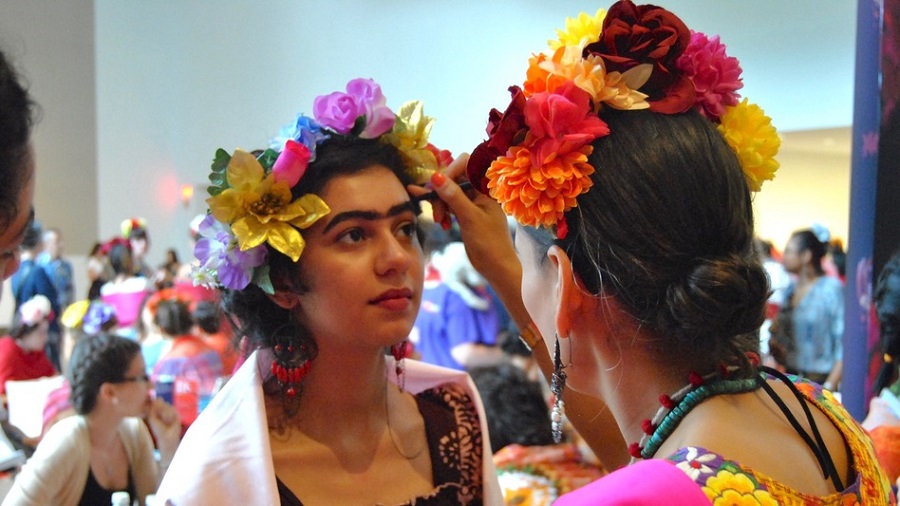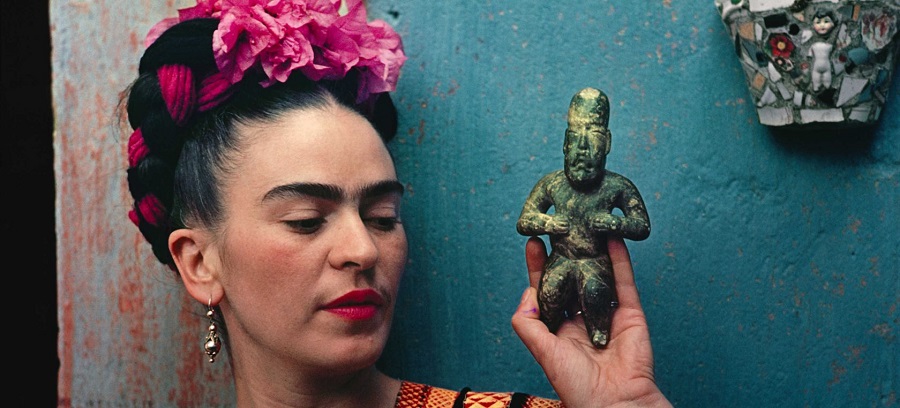The Dallas Museum of Art tried to set a Guinness World Record on Thursday for the largest group of people dressed as Frida Kahlo in one place. The day also marked the birth anniversary of the iconic Mexican painter who died in 1954.
Setting a world record in commemoration of Frida Kahlo
Thursday would have been Frida Kahlo’s 110th birthday.
The Mexican painter died in 1954 but the Dallas Museum of Art celebrated the anniversary of her birth with an attempt to create a world record for the largest gathering of people dressed as Kahlo.
The museum submitted an application with Guinness World Records back in January and got the process started. Guinness provided clear guidelines to ensure that there was some level of standardization for costume records.
And the rules were pretty clear.
In order to be counted as a lookalike for the purposes of the record participants had to have four components: a flower-printed dress that extends below the knee on all sides; a red or pink shawl; flowers in the hair (with a minimum of three flowers) and a unibrow joining the eyebrows, using either makeup or fake hair.
Guidelines also required participants to gather in an enclosed space and be counted in an approved method.
As well as two independent witnesses and a “steward” for every 50 participants as a mass participation record requires.
The celebration included dance and documentary presentations, and birthday cake for the attendees.
“I’ve recently looked up what Frida does and seen her self-portraits, and she’s so true to herself and proud of herself and it’s an inspiration,” Sofia Valadez, a 13-year-old participant.
“She’s such a strong, independent woman. And I like her eyebrows”
In order to be officially listed as the Guinness World Record holder, the museum will have to submit extensive evidence. Including photos, videos and a log of everyone who participated.
There’s no deadline for the museum to submit its documentation. Once it does the review process takes approximately 12 weeks, since Guinness receives about 1,000 submissions each week.
There is no previous record on the books for a Kahlo mass participation event, but the base number required to be deemed a record-holder in a new category is 250.

Blockbuster exhibition
While hundreds of Kahlo lookalikes gathered to try to set a record to honor the Mexican artist outside the Museum. Inside the Museum an exhibition honored the artist.
Some of her work was on display in the museum as part of the exhibition “México 1900–1950: Diego Rivera, Frida Kahlo, José Clemente Orozco, and the Avant-Garde.”
The show proved to be a blockbuster.
With more than 75,000 visitors from its opening in March through mid-June, it had already become one of the museum’s top ten most attended exhibits since 2000.
The high attendance had its reasons
Some of that high attendance can be attributed to the interest and enthusiasm of Dallas’ Latino community, and some can certainly be attributed to the significance and enduring popularity of Kahlo.
All of the above is great news for Agustin Arteaga, who is off to a great start as the museum’s new director. It’s also great news for Dallas, to have an art museum serving everyone in the city.
“Since they’ve brought this exhibition, they brought so many people in and they made this accessible,” said Claudia Curici, a visitor. “It was amazing. And all of these people turning out, I think, is recognition for what they did for the community.”
“It was amazing. And all of these people turning out, I think, is recognition for what they did for the community.”
“México 1900-1950: Diego Rivera, Frida Kahlo, José Clemente Orozco, and the Avant-Garde,” is on display until July 16.

Iconic Kahlo
Mexican artist Frida Kahlo is remembered for her self-portraits, pain and passion, and bold, vibrant colors. She is celebrated in Mexico for her attention to Mexican and indigenous culture. She’s also celebrated by feminists for her depiction of the female experience and form.
Kahlo, who suffered from polio as a child, nearly died in a bus accident as a teenager. She suffered multiple fractures of her spine, collarbone and ribs, a shattered pelvis, broken foot and dislocated shoulder. She began to focus heavily on painting while recovering in a body cast. In her lifetime, she had 30 operations.
She died at age 47 after suffering from deteriorating health and complications stemming from a trolley accident that caused her extensive physical pain for most of her adult life.
However, Frida Kahlo’s bathroom kept its secrets for 50 years.
When the Mexican artist died, in 1954, her husband, Diego Rivera, shut away around 300 of her belongings in a tiny bathroom in the house they had shared in Mexico City.
He requested the doors remain locked until 15 years after his own death but although he survived only three more, the bathroom was undisturbed until 2004, when curators at the house-turned-museum broke the lock.
The Mexican artist has drawn more and more attention in recent years, for her emblematic and iconic style. In fact, she’s celebrated in different places as the Fridamania has taken in.
In Missouri, admirers of Mexican painter Frida Kahlo’s art and emblematic style have taken over downtown Bay St. Louis for the last two years during Frida Fest.

Source: Dallas News


